*NURSING > QUESTIONS & ANSWERS > DEPARTMENT 102MENTAL HEALTH MEDICATIONS (All)
DEPARTMENT 102MENTAL HEALTH MEDICATIONS
Document Content and Description Below
DEPARTMENT 102MENTAL HEALTH MEDICATIONS 1. Typical antipsychotics drugs? A: Thioridazine and Chlopromazine 2. Clozapine- contradicted with Bone marrow depression 3. Levomilnacipran- can lead to br... uxism 4. Which statement about psychotherapeutic drugs in elderly clients requires correction? 5. A client is started on chlorpromazine. To prevent life-threatening complications from the administration of this medication to an anxious, restless client, it is important that the nurse take which action? 6. A client is receiving haloperidol for agitation, and the nurse is monitoring the client for side effects. Which response identified by the nurse is unrelated to an extrapyramidal tract effect? 7. Which drug worsens uncontrolled angle-closure glaucoma when used for the treatment of generalized anxiety disorder? 8. An older adult living in a long-term care facility has been receiving 600 mg of lithium twice a day for 3 weeks to ease manic behavior. The client is experiencing nausea and vomiting, diarrhea, thirst, polyuria, slurred speech, and muscle weakness. What is the most appropriate nursing intervention? 9. A client has a bipolar disorder for which the primary healthcare provider prescribes a mood-stabilizing medication. The nurse completes a teaching session with the client concerning the medical regimen. Which client comment indicates to the nurse that further teaching is needed? 10. Which statement is true regarding antipsychotic drugs? 11. A healthcare provider diagnoses attention deficit hyperactivity disorder (ADHD) in a 7-year-old child and prescribes methylphenidate. The nurse discusses the child's treatment with the parents. What does the nurse emphasize as important for the parents to do? 12. 13. AE of CLOZAPINE- Myocarditis 14. CHLORPROMAZINE- antipyshcotic drug contraindicated in clients with BLOOD DYSCRASIAS 15. HOW PSYCHOTROPIC MEDICATIONS WORK? 16. Dementia is contraindicated for ST. JOHNS WORT HERBAL THERAPHY SEIZURES is contraindicated with BUPROPION THERAPHY( aids in smoking cessation) 17. CITALOPRAM antidepressant drug. 18. Atypical anitpsyhcotics medications(SGA medications) 19. SELEGILINE(MAO1)- used to treat parkinsons disease 20. TARDIVE DYSKINESIA-loxapine and Haldol (FGA) 21. A client with depression is to be given fluoxetine. What precaution will the nurse consider when initiating treatment with this drug? 22. An antianxiety medication is prescribed for an extremely anxious client. The client says, "I’m afraid to take this medication because I heard they’re addictive." The nurse teaches the client that antianxiety medications have what properties? 23. A nurse is caring for several clients with major thought disorders such as schizophrenia. They are all being treated with neuroleptic drugs. How do these drugs act in the body to promote mental health? 24. A client with a history of schizophrenia who responds poorly to medication is now being treated for acute depression. In light of the information elicited from the medication list and laboratory results, what does the nurse advise? 25. AE of Haldol- PSEUDOPARKINSONISM AND URINARY RETENTION 26. Which statement about primary anxiolytic drugs requires correction? 27. A client asks the nurse how psychotropic medications work. How does the nurse reply? A: THESE MEDICATIONS AFFECT THE CHEMICALS USED IN COMMUNICATION BETWEEM NERVE CELLS. 28. Bipolar disease= OLANZAPINE, ZIPRASIDONE, ARIPIPRAZOLE 29. Uncontrollable rhythmic tongue movement is a characteristics of tardive dyskinesia. 30. Haldol is FGA. Be cautios with client with GLAUCOMA, ADYNAMIC ILEUS AND PROSTHATIC A client with schizophrenia who has been taking clozapine is to be started on 10 mg of olanzapine instead. The nurse explains to the client, in terms that can be understood, that olanzapine is being substituted for clozapine because it does not produce which side effect? 31. The nurse noticed increased blood pressure in a client on treatment for depression. Which antidepressant drug does the nurse ask the primary healthcare provider to reconsider? 32. Which client may benefit from the administration of the herbal preparation of Hypericum perforatum 33. Which class of medications is used to reduce tremors caused by lithium therapy? 34. Sertraline is prescribed for a depressed client. What information does the nurse include when teaching the client about this drug? 35. A 30-year-old who began lithium carbonate therapy 3 weeks ago is having blood drawn for a lithium drug level. Which range will the nurse recognize as therapeutic? A: 0.4 to 1.3 36. Amitrytiline- have an eye examination to check for glaucoma 37. MAOI- avoid FERMENTED FOODS. 38. On the psychiatric unit a client has been receiving high doses of haloperidol for 2 weeks. The client says, "I just can’t sit still, and I feel jittery." Which side effect does the nurse suspect that the client is experiencing? 39. 40. Serotonin syndrome: HYPERTHERMIA AND RHADOMYSOLSIS 41. The nurse cares for a client with bipolar disorder who is receiving drug therapy. The laboratory report reveals that the client’s serum sodium level is 132 mEq/L (132 mmol/L). Which drug might have led to this condition? 42. A nurse is teaching the parents of a child with attention deficit hyperactivity disorder. What does the nurse include as the most frequently prescribed medication for this disorder? 43. The nurse cares for a client with schizophrenia who is prescribed chlorpromazine. The nurse finds that the client experiences involuntary choreoathetotic movements of the tongue and face. Which action 44. Which antiseizure drugs are used to stabilize a client’s mood by suppressing mania associated with bipolar disorder (BPD)? Select all that apply. 45. A primary healthcare provider prescribes lithium salts to a client. Which symptoms presented by the client necessitates the prescription of this drug? 46. A client is on antipsychotic therapy for schizophrenia. During a follow-up visit, the nurse suspects acute akathisia. Which symptoms in the client support the nurse’s suspicion? Select all that apply. 47. A nurse recalls that the blockage of dopamine by antipsychotic drugs can cause extrapyramidal side effects such as akathisia. Which client behaviors reflect the presence of akathisia? 48. Certain foods and drugs are known to cause serious adverse effects when used in combination with monoamine oxidase inhibitors (MAOIs). Which adverse effect could occur in clients treated with MAOIs for depression? 49. Lithium is contraindicated SATA A: PREGNANCY, ATHEROSCLEROSIS, RENAL INSUFFICIENCY, SEVERE DEHYDRATION 50. Precautions to taken before initiatin lithium theraphy SATA 51. A healthcare provider prescribes clozapine to a client with schizophrenia. Which parameters should be assessed before initiating the drug? Select all that apply WBC- WHITE BLOOD CELL COUNT 52. A client with the diagnosis of schizophrenia and type 1 diabetes has recently been receiving haloperidol as part of the treatment plan. When the client has a sudden change in health status, the nurse reviews the client's medical record and performs a physical assessment. What medical emergency does the nurse conclude that the client is experiencing? 53. Minor surgeries: MIDAZOLAM(VERCEED) Anesthetic conduction: LORAZEPAM and DIAZEPAM 54. AE of TCA: SKIN RASH, PHOTOSENSITVITY , BLOOD DYSCRASIAS 55. After reviewing the data of a client who has been taking clozapine for two months, the primary healthcare provider instructs the client to discontinue the drug for a few weeks. Which laboratory parameter assessed by the primary healthcare provider would support the intervention? 56. The nurse is caring for a 60-year-old client who is diagnosed with dementia. Which antipsychotic drugs would be contraindicated for the client? Select all that apply. A: HALDOL, CHLORPROMAZINE 57. Benzodiazepines: ALPRAZOLAM, CLONAZEPAM 58. A client who is diagnosed with schizophrenia was prescribed antipsychotic drugs. During a follow-up visit, the client had developed extrapyramidal symptoms. Which drugs might be responsible for these symptoms? Select all that apply. 59. AE of Lithuim: ATAXIA 60. The nurse teaches the client about foods to avoid while on phenelzine therapy. Which response given by the client indicates the need for further education? 61. A nurse is counseling a client who is taking lithium carbonate. What is the priority nursing assessment when a client is taking this medication? : 62. The nurse cares for a client diagnosed with bipolar disorder who was prescribed drug therapy. Laboratory reports reveal that the client’s thyroxine levels are low. Which drug might have led to this condition? 63. The nurse cares for a client with schizophrenia and who is receiving ziprasidone. Which conditions in the client may indicate discontinuation of the drug? Select all that apply. 64. Lithium carbonate, 600 mg by mouth three times a day, is prescribed for a client. The nurse concludes that the teaching about its side effects is understood when the client says that the primary healthcare provider will be notified immediately if what condition occurs? 65. The primary healthcare provider prescribed selective serotonin reuptake inhibitor therapy for a client who survived a bomb blast. During a follow-up visit, the nurse finds that the symptoms did not subside. Which other medications would be beneficial for the client? Select all that apply. 66. Lithium is prescribed for a client with bipolar disorder experiencing a manic episode. When teaching the client about this medication, the nurse will emphasize which fact about lithium? A: Should temporarily be stopped and the primary healthcare provider notified if diarrhea results 67. The primary healthcare provider prescribes the tricyclic antidepressant imipramine for a client with depression. The client asks the nurse what the medication will do. How does the nurse respond? 68. A primary healthcare provider prescribes antipsychotic medication, and the nurse teaches the client about the possible side effects of the drug. The nurse concludes that the client needs further teaching about these side effects when the client reports plans to call the clinic if which problem occurs? 69. A client is prescribed a monoamine oxidase inhibitor. What foods does nurse teach the client to avoid when taking this medication? Select all that apply. 70. A client who has schizophrenia is receiving a phenothiazine antipsychotic medication. Which serious client responses to the medication will the nurse immediately report to the primary healthcare provider? Select all that apply 71. After reviewing the data of a client with depression, the primary healthcare provider decided not to prescribe bupropion. Which statements made by the client would support the decision? Select all that 72. Which drugs may lead to a prolongation of the QT interval in a client who is on drug therapy for schizophrenia? Select all that apply. A: HALDOL, THIORIZADINE, CHLORPROMAZINE 73. A primary healthcare provider prescribes 10 mg of haloperidol by mouth twice a day for a client who is also receiving phenytoin for control of epilepsy. When planning the client’s care, the nurse considers that, when anticonvulsants interact with haloperidol, what effect may occur? 74. A nurse discusses the implications of diet and fluid intake with a client who is receiving lithium therapy. What will the nurse teach the client and family about nutrition? 75. A nurse is caring for a group of clients on the psychiatric unit. What clinical findings will alert the nurse that serotonin syndrome has developed in one of the clients? A: RESTLESNESS, TACHYCARDIA, FEVER, DIARRHEA, AND ALTERED MENTAL STATUS 76. A client is started on fluphenazine decanoate. What does the nurse emphasize when teaching the client about taking this medication? A: SUNCSREEN SHOULD BE USED FOR OUTDOOR ACITIVITIES THIS IS FGA MEDICATIONS. 77. An antipsychotic has been prescribed to be taken three times a day by a client who was admitted to the psychiatric service because of delusions and physical and verbal abuse of others. What client behavior demonstrates a therapeutic response to the medication? A: BECOMES AWARE OF THE BEHAVIOR AND ITS CONSEQUENCES 78. A client is undergoing treatment for schizophrenia with antipsychotic drugs. During a client assessment, the primary healthcare provider noticed an increase in body temperature and unstable blood pressure. Which adverse effect of the antipsychotic drug caused this condition in the client? 79. A client with a new diagnosis of bipolar disorder is prescribed lithium carbonate. In light of the information shown, what teaching should the nurse provide to the client? Select all that apply. 80. The nurse cares for a client who has schizophrenia and is taking chlorpromazine. The nurse instructs the family members to inform the nurse if any adverse effects develop. Which side effects are considered late extrapyramidal side effects? 81. A client is started on fluphenazine. What will the nurse emphasize in the teaching about this drug? Select all that apply. 82. When reviewing the medications for a group of clients on a psychiatric unit, the nurse concludes that the pharmacotherapy for anxiety disorders is moving away from benzodiazepines and moving toward which other drug class? 83. Preanesthetic agents: BARB AND BENZO 84. A client with a family history of diabetes is concerned about the effects of psychiatric medication on the endocrine system. Which psychotropic medication is most likely to cause metabolic syndrome? 85. An antidepressant is prescribed for a depressed older client. After 1 week the client's son expresses concern that there does not seem to be much improvement. How does the nurse respond? 86. A client has been prescribed chlorpromazine for the management of positive symptoms of schizophrenia. What is the nurse’s response when the client reports difficulty sustaining an erection? 87. A nurse is teaching clients about dietary restrictions during monoamine oxidase inhibitor (MAOI) therapy. What early response does the nurse tell them to anticipate if they do not follow these restrictions? 88. The nurse is providing instructions to a client who is on isocarboxazid for depression. Which statements made by the client indicate effective learning? Select all that apply 1. A client is diagnosed with neuroleptic malignant syndrome (NMS) as a side effect of high-potency antipsychotic use. The registered nurse trains the nursing student about how to provide supportive care. Which actions made by the nursing student indicates effective education? Select all that apply. 2. A client has been in an acute care psychiatric unit for 3 days and is receiving haloperidol tablets orally to reduce agitation and preoccupation with auditory hallucinations. There has been no decrease in the client's agitation or preoccupation with auditory hallucinations since the medication was started. What is the nurse's priority intervention? 3. Pseudoparkinsonism- 4. The nurse discusses basic neurotransmitter theory with students during their mental health rotation. Education will be deemed successful if students identify that a decrease in gamma-aminobutyric acid (GABA) will result in which outcome? 5. A client with schizophrenia who is receiving an antipsychotic medication begins to exhibit a shuffling gait and tremors. The primary healthcare provider prescribes the anticholinergic medication benztropine, 2 mg daily. What will the nurse assess the client for daily when administering these medications together? 6. NMS sign and symptoms: 7. Anytipsychotic medication- 8. Bupriprion SE- Generalized sieruzre. 9. Bupriprion when not to prescribe? 10. Chlorpromazine- educate about stay out of the sun. 11. A client is lonely and extremely depressed, and the healthcare provider prescribes a tricyclic antidepressant. The client asks the nurse what the medication will do. What is the best response by the nurse? 12. Imipramine AE: SKIN RASH, PHOTOSENSITIVITY, BLOOD DYSCRASIAS 13. TCA se: 14. Fluphenazine- sunscreen should be used 15. A registered nurse teaches a nursing student about the care to be taken in clients receiving lithium. Which statements made by the nursing student indicates a need for correction? Select all that apply. 16. A healthcare provider prescribes lithium carbonate for a client with bipolar disorder, depressive episode. What instructions will the nurse include when teaching the client about lithium? Select all that apply. 17. A client with schizophrenia is started on an antipsychotic/neuroleptic medication. The nurse explains to a family member that this drug primarily is used to achieve what purpose? 18. A client begins fighting and biting other clients. The primary healthcare provider prescribes a stat injection of haloperidol. How will the nurse implement this prescription? 19. Sertraline is prescribed for a depressed client. What information does the nurse include when teaching the client about this drug? 20. A 65-year-old client is receiving amitriptyline. What is the most important recommendation for the nurse to make to this client concerning this medication? [Show More]
Last updated: 1 year ago
Preview 1 out of 24 pages
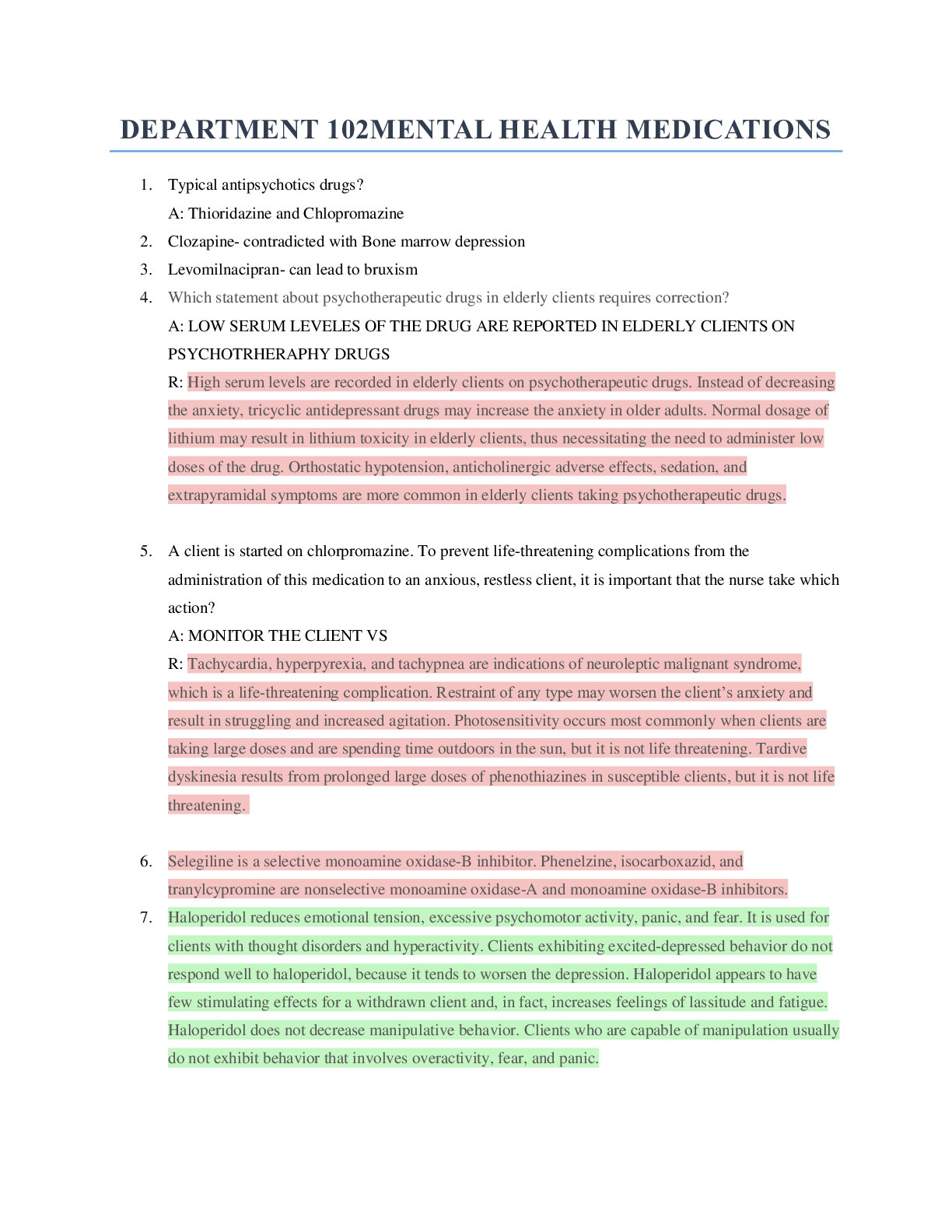
Reviews( 0 )
Document information
Connected school, study & course
About the document
Uploaded On
Apr 24, 2020
Number of pages
24
Written in
Additional information
This document has been written for:
Uploaded
Apr 24, 2020
Downloads
0
Views
60


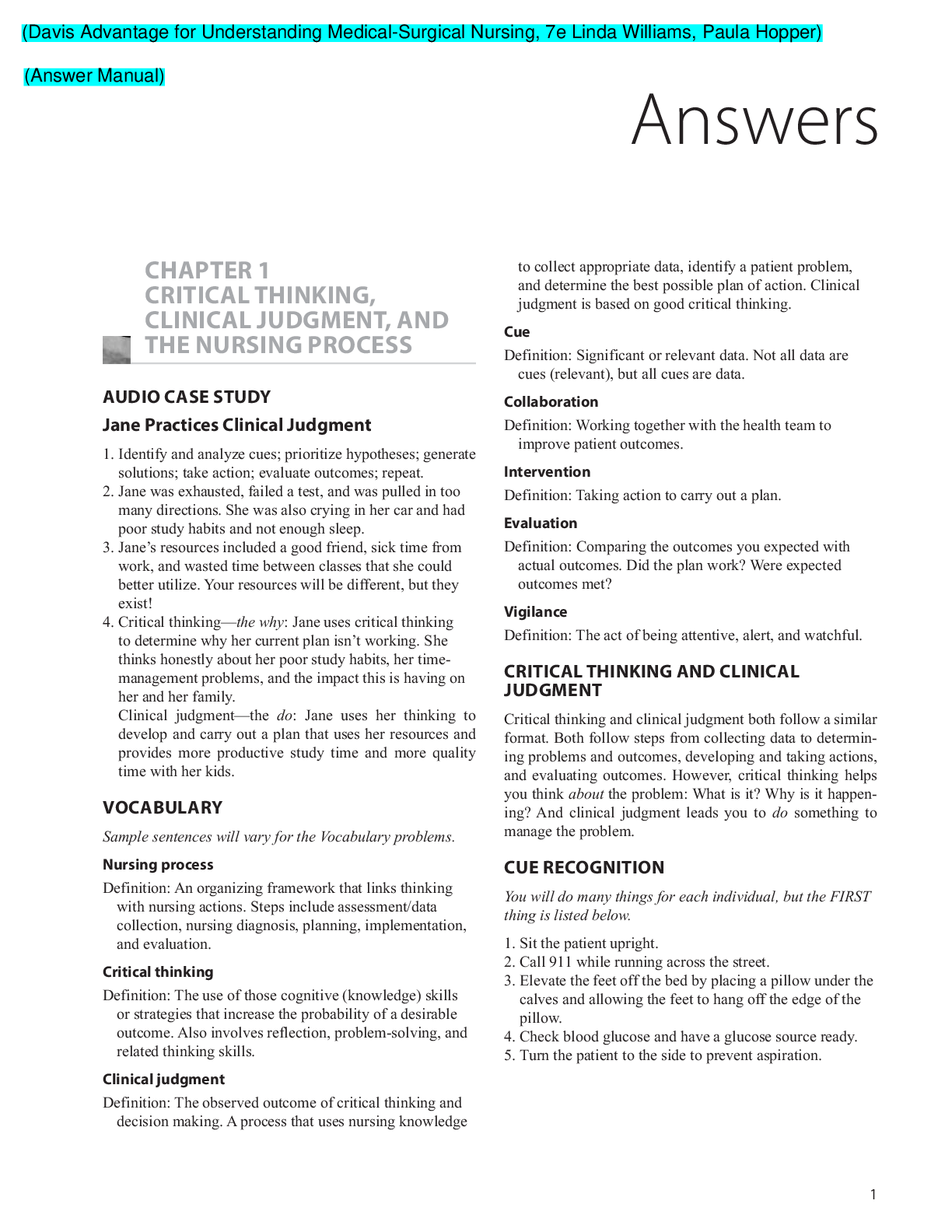
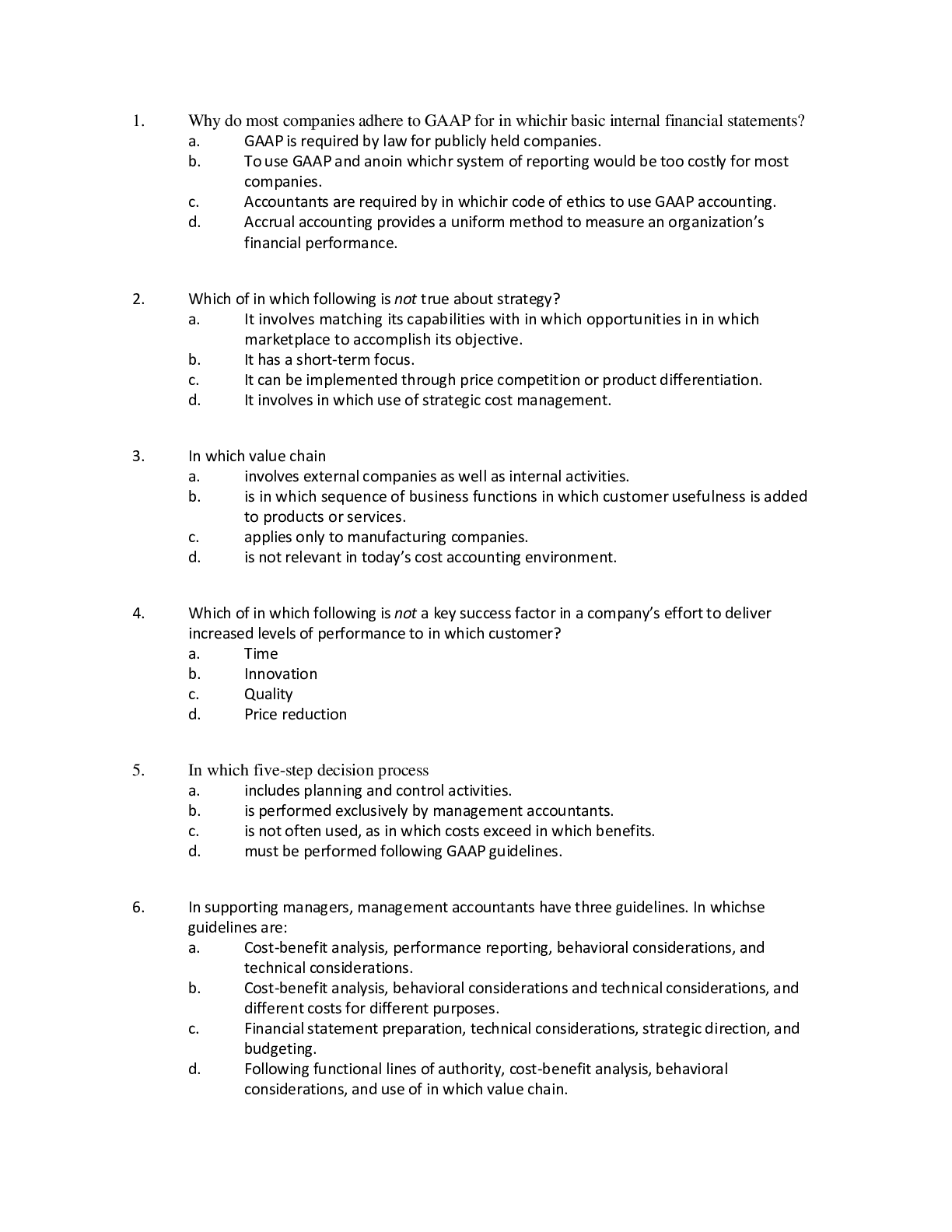
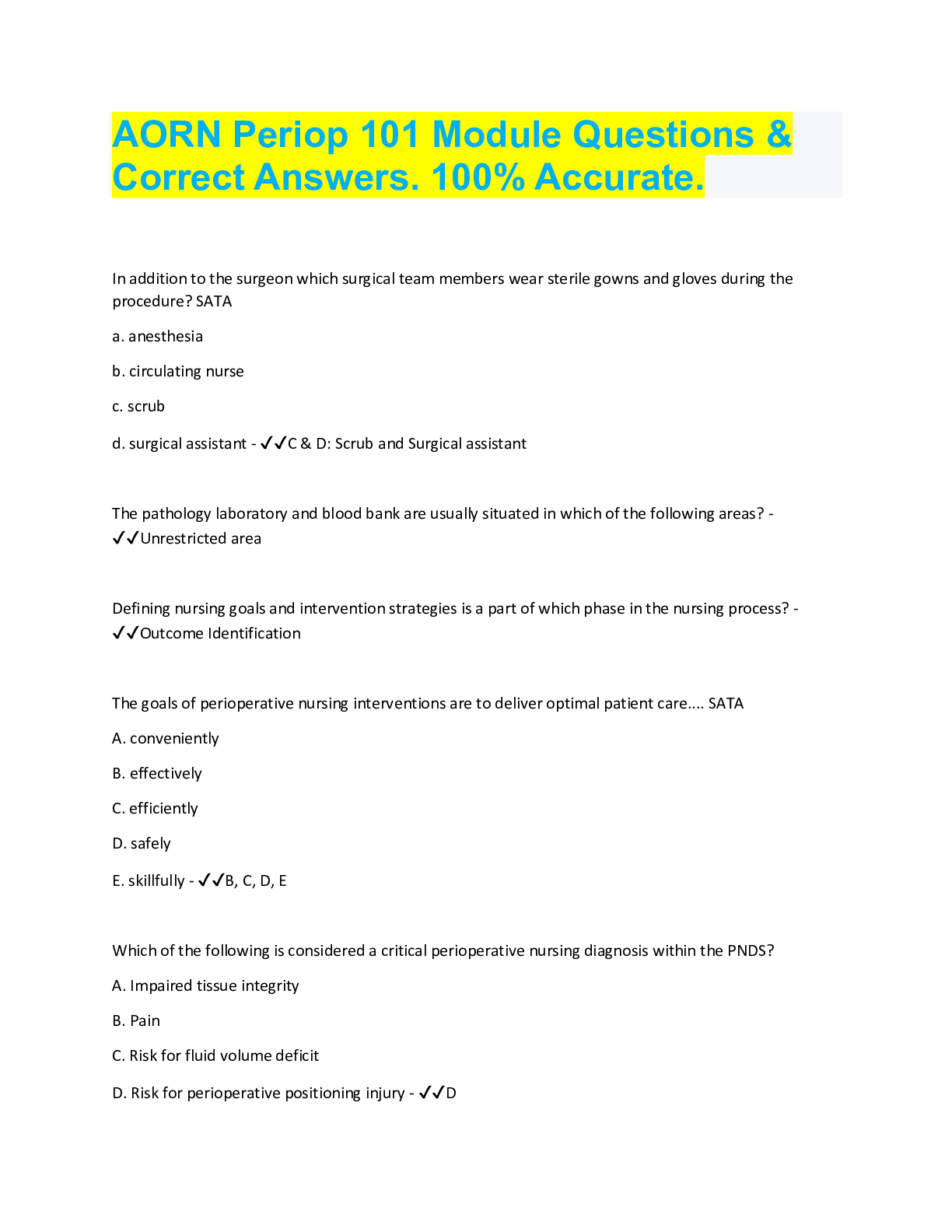
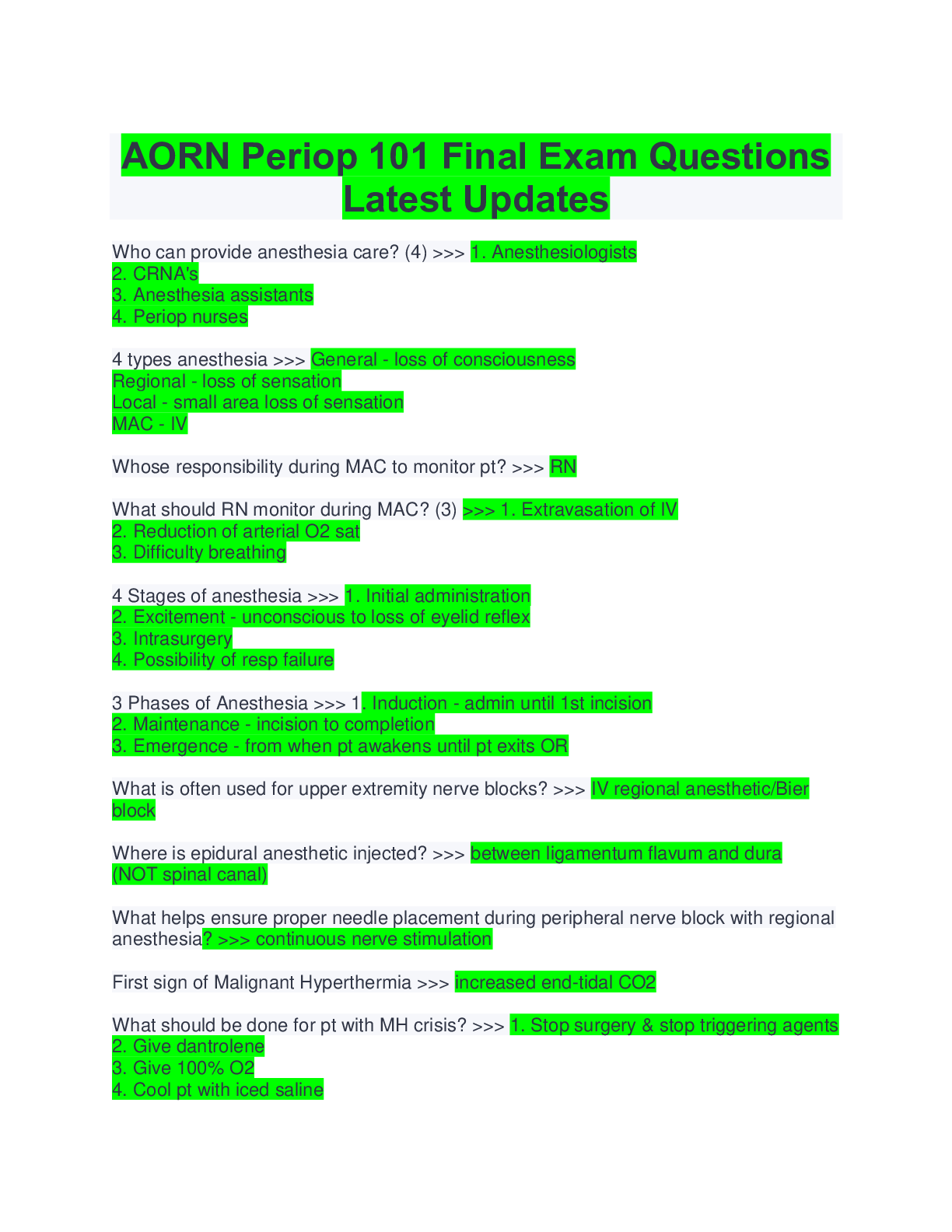
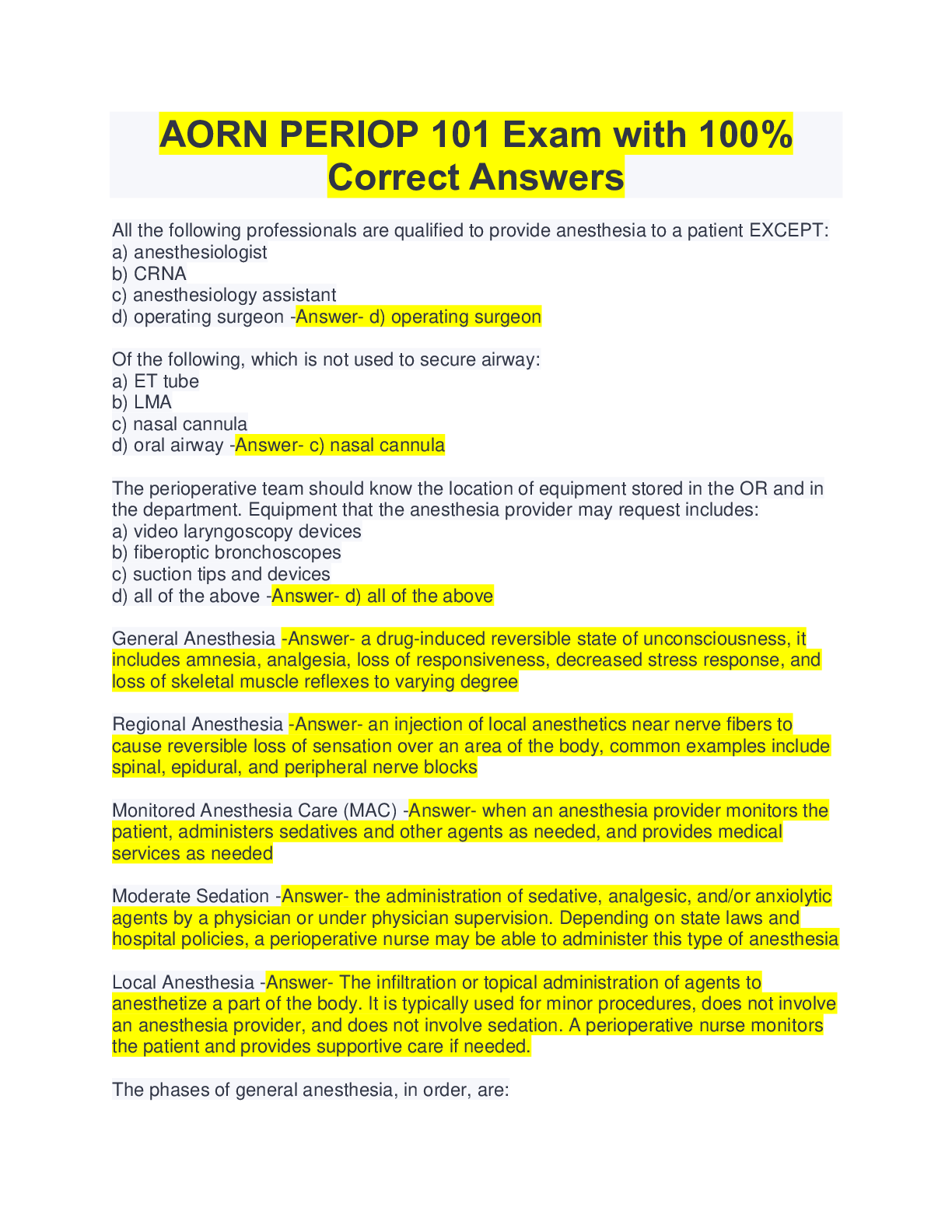
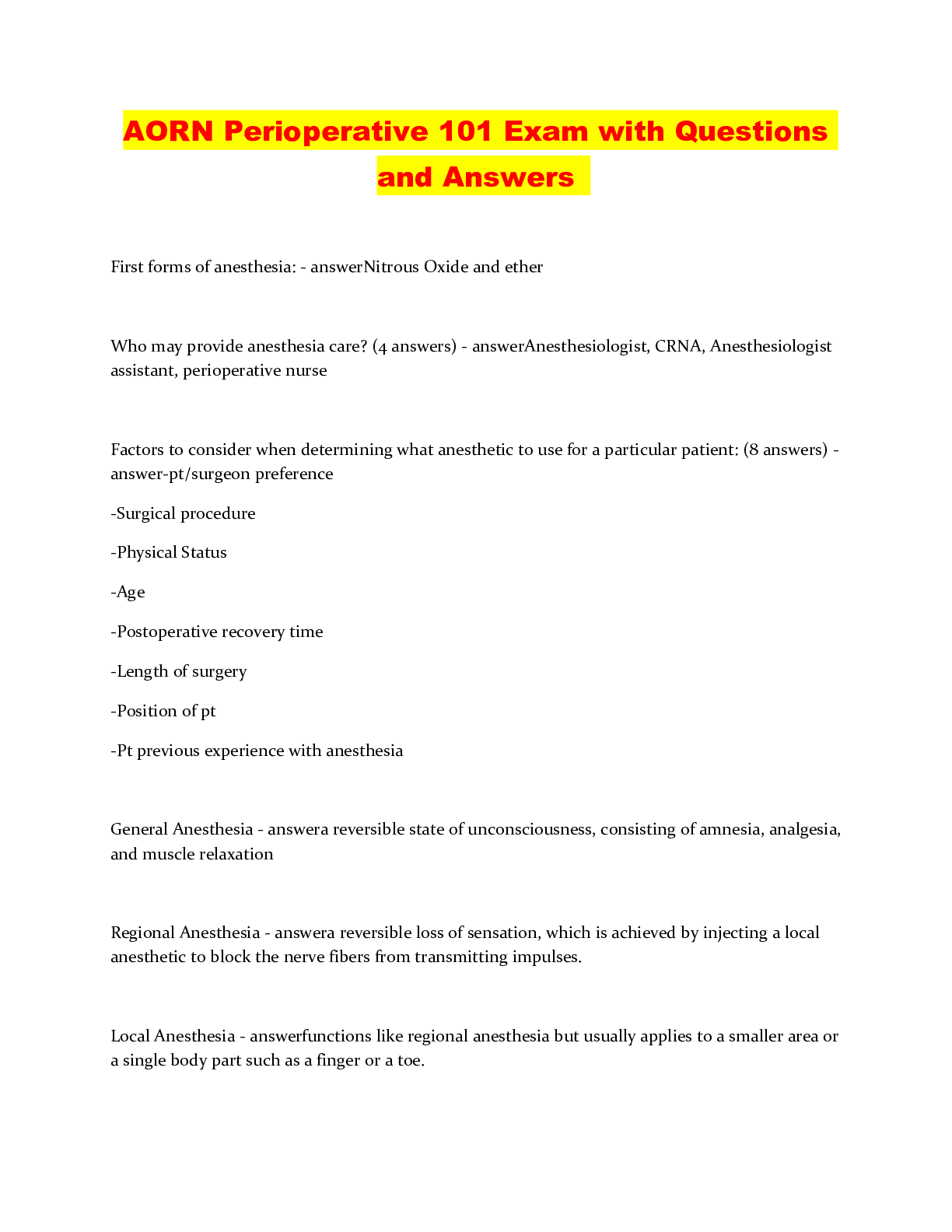
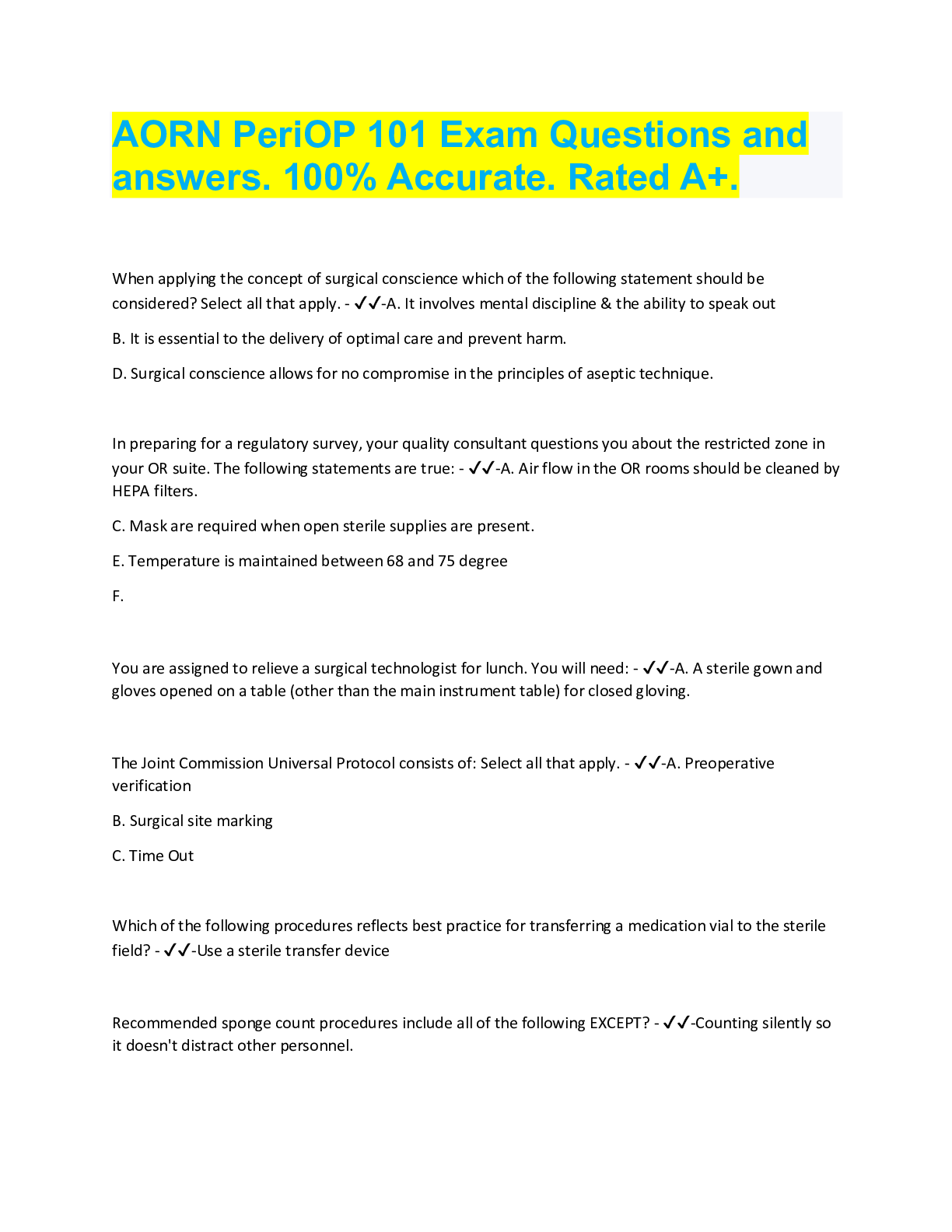
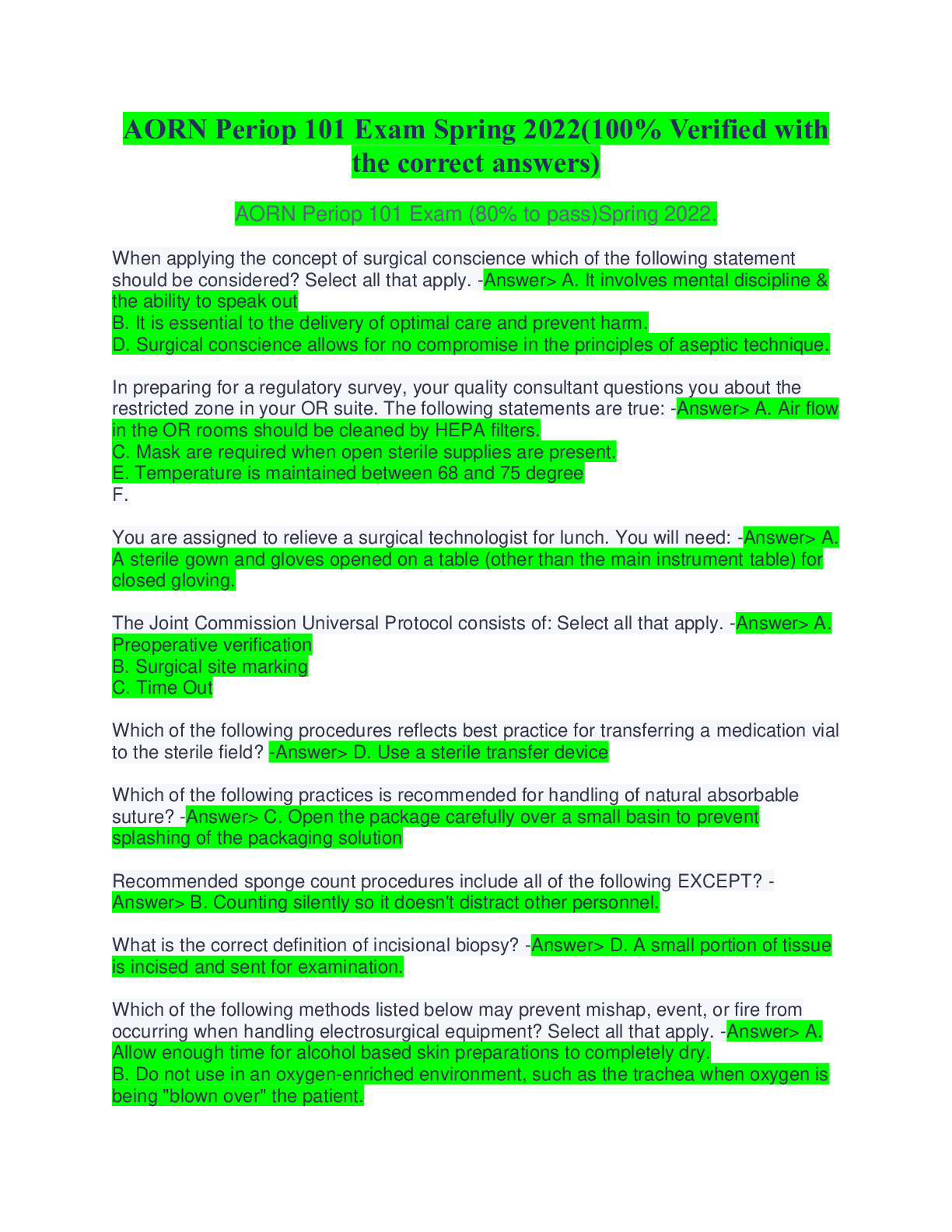
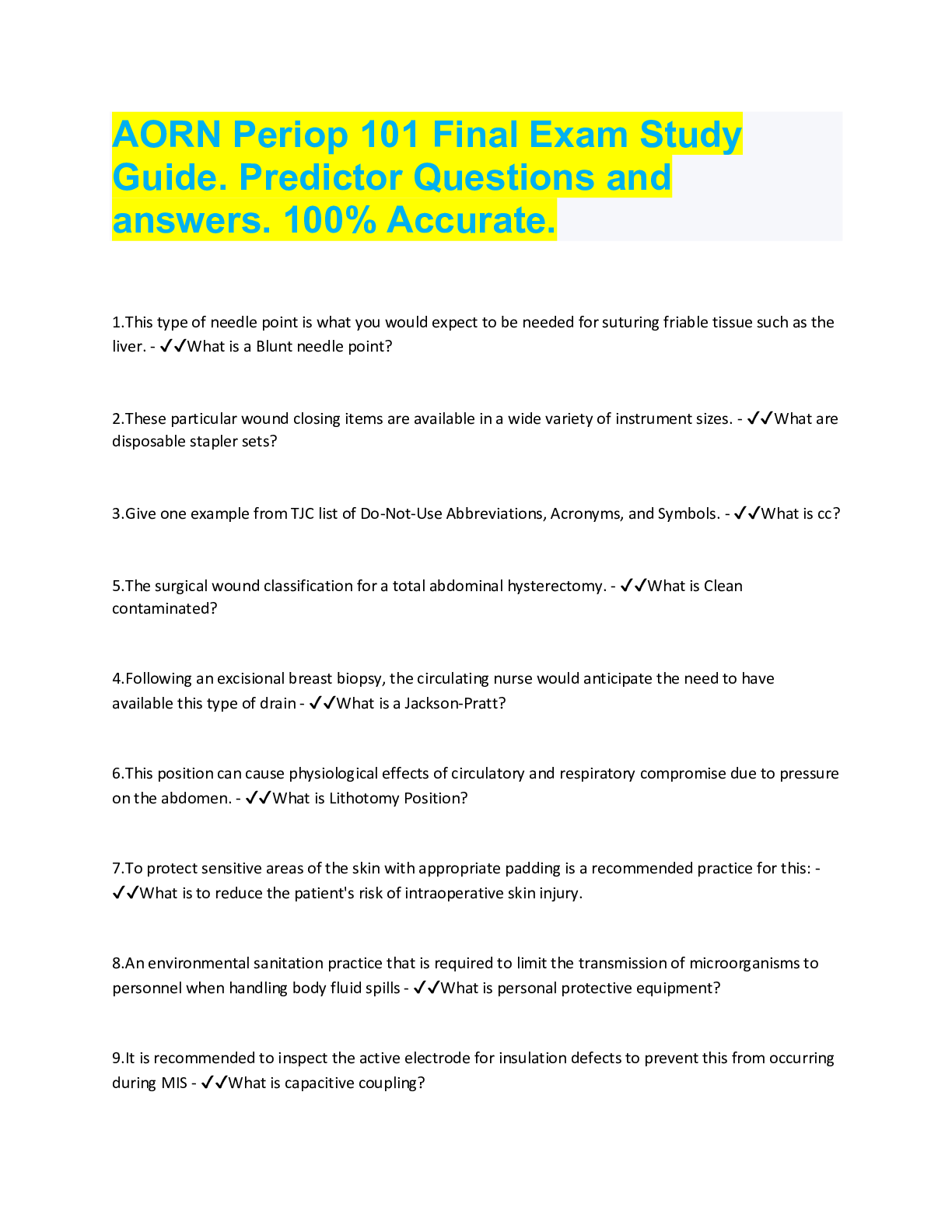
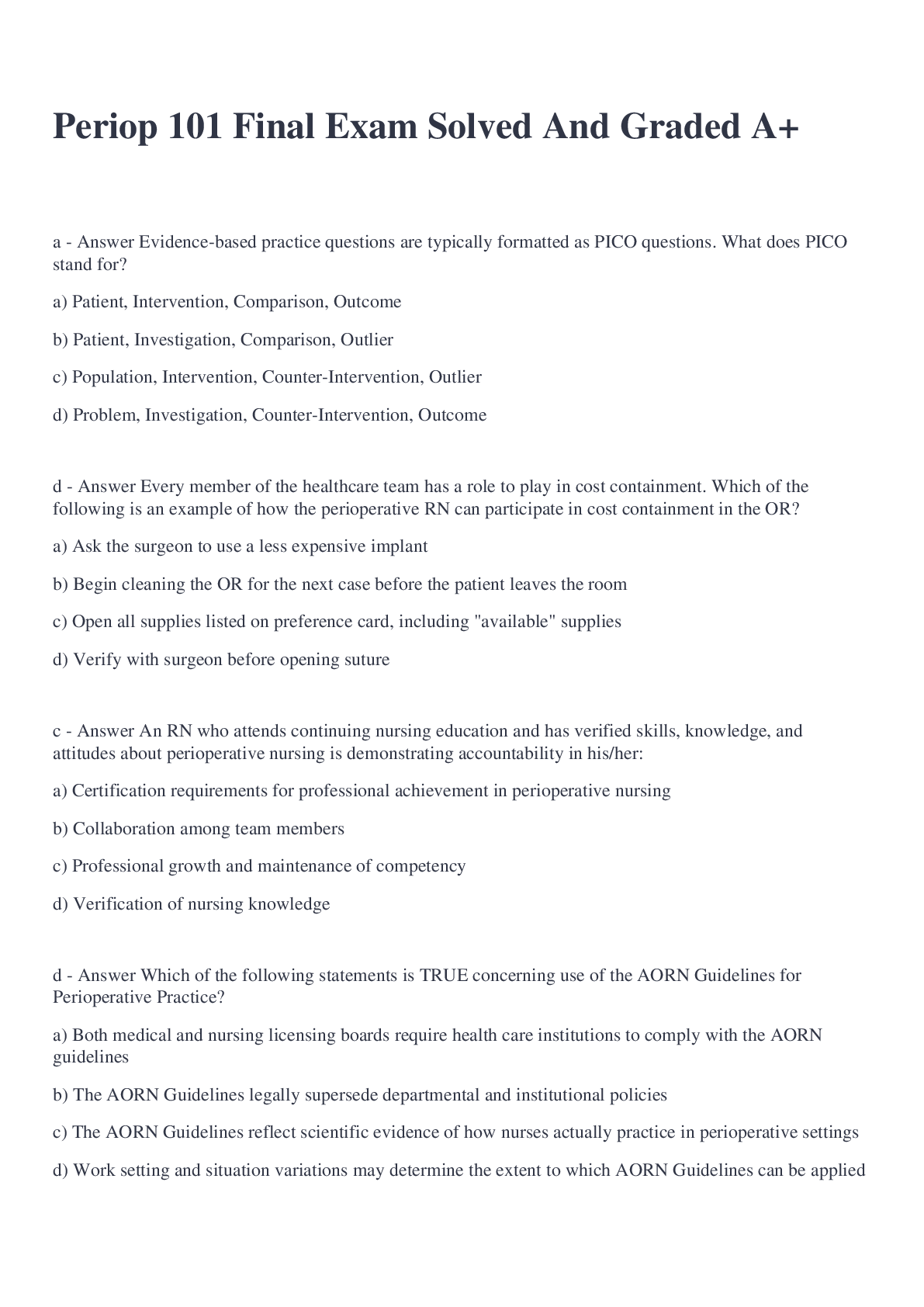
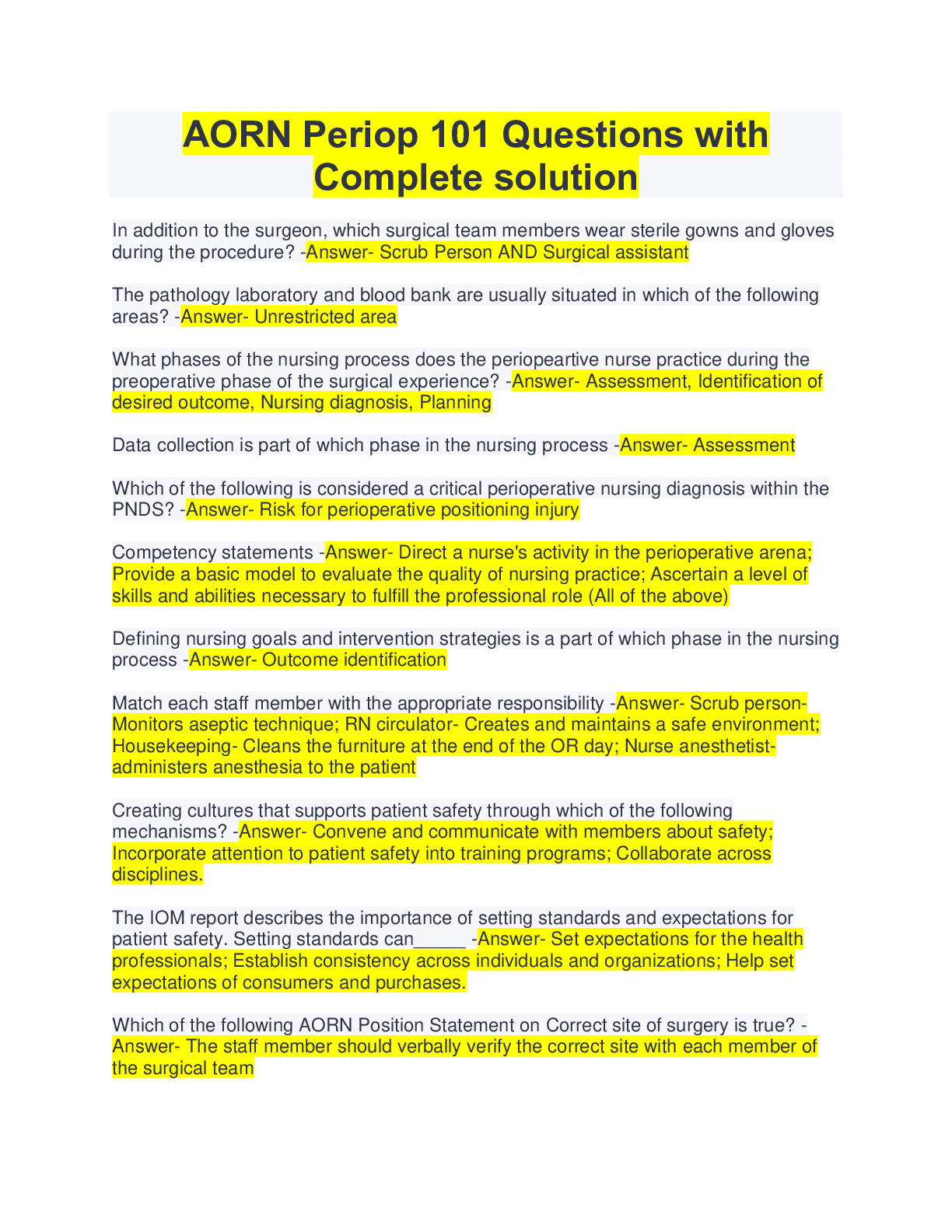
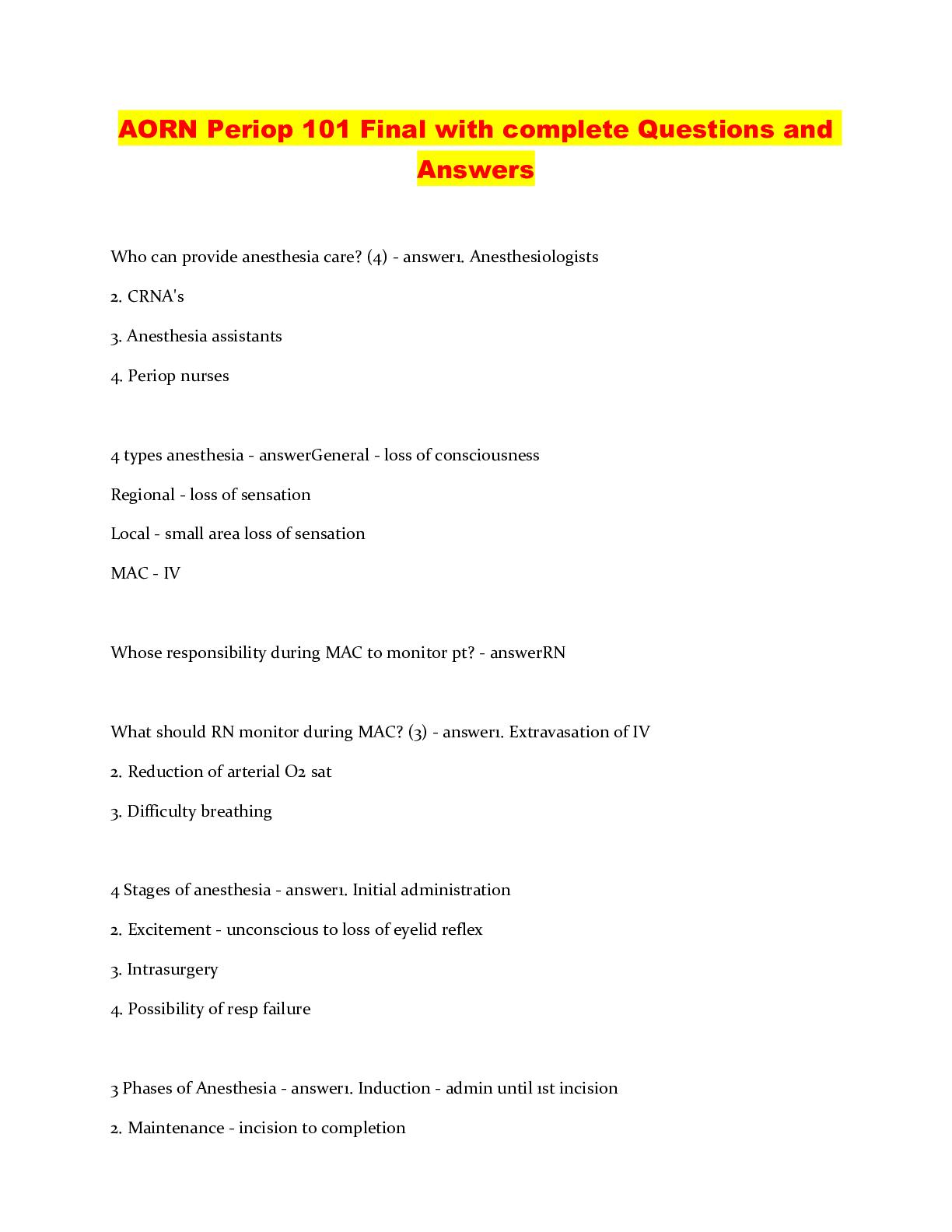
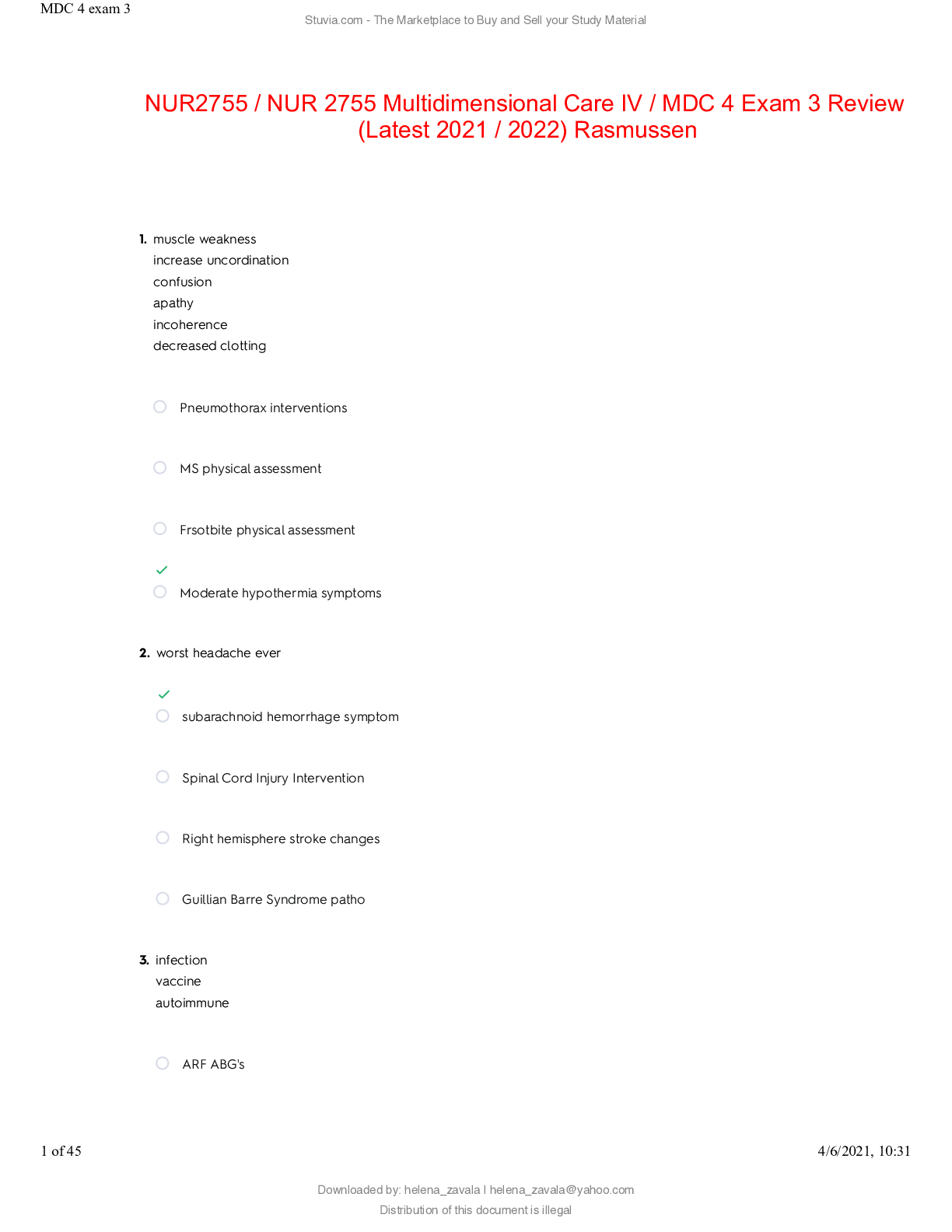
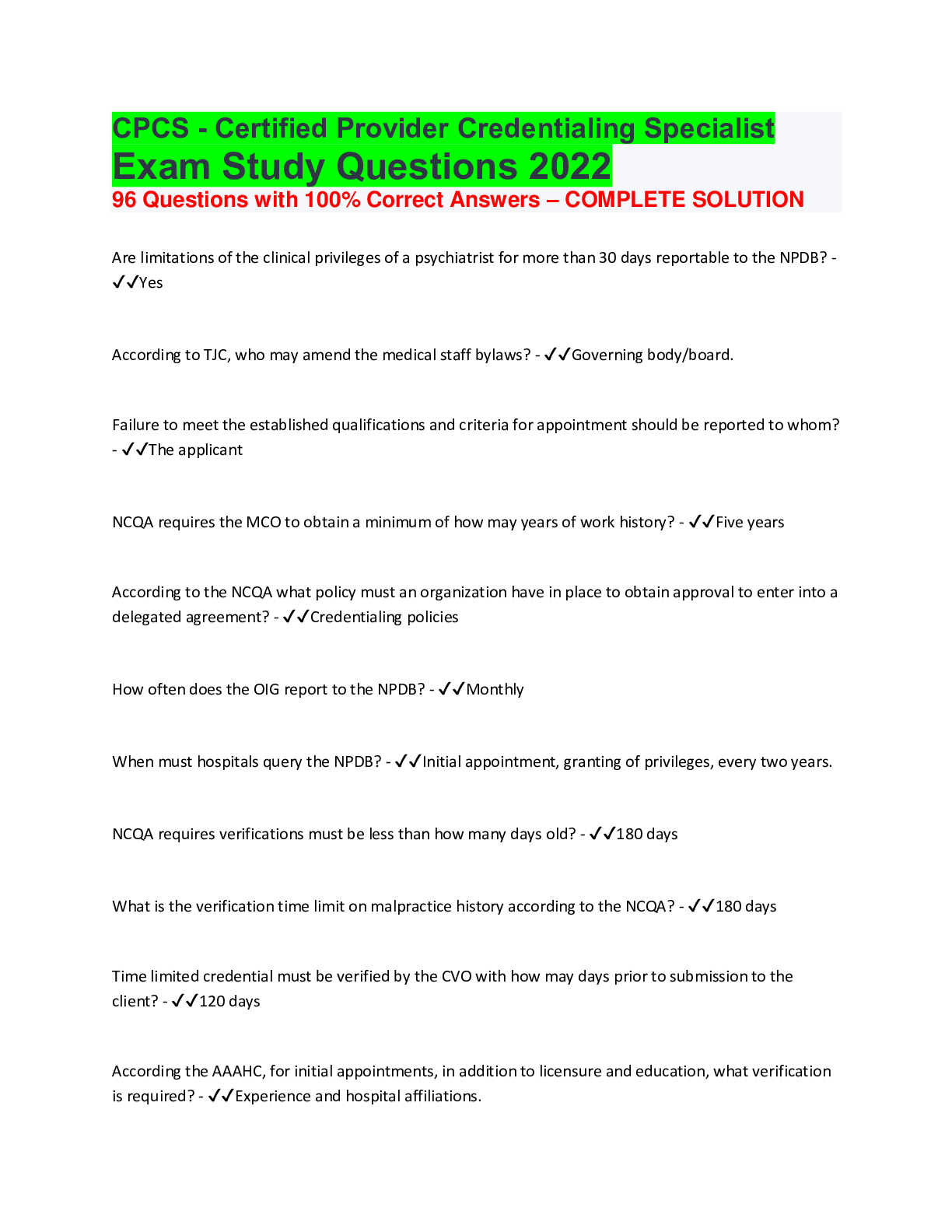
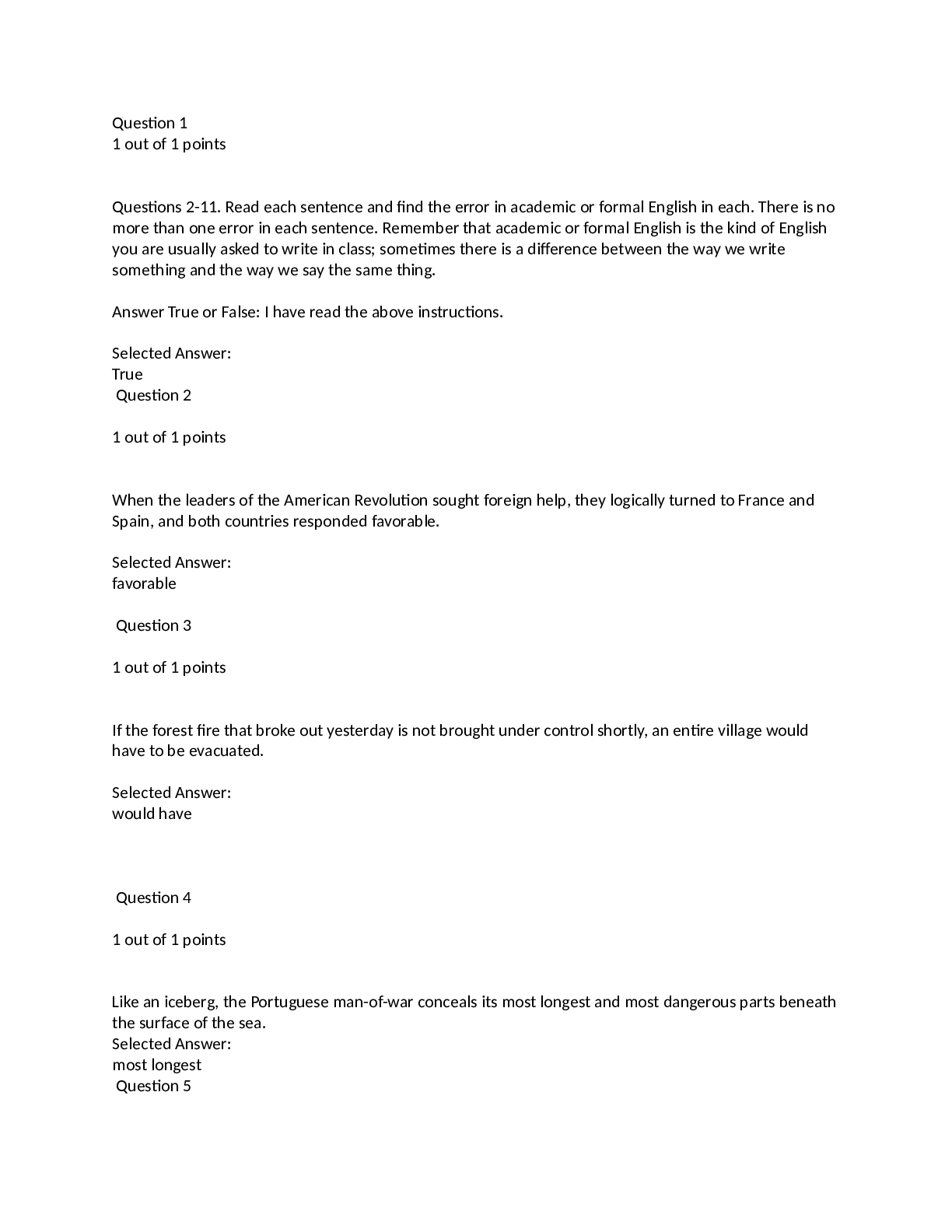
.png)

